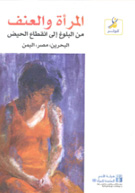Women and menstruation: the consecration or getting out of violence or out of it: Qualitative study on women and violence during the life cycle

With the lack of studies dealing with post-menopausal women and their psychological and social transformations in various domains, the Center of Arab Women for Training and Research, with the support of UN/WOMEN, has decided to shed light on this age group, , the impact of women’s reproductive role on their identity, on the evolution of the menopause phase, and women’s experience with gender based violence during their life cycle.The study was achieved through field surveys in three Arab countries, Bahrain, Egypt and Yemen, on random sample groups made up of 108 women and 36 teenage girls evenly distributed over the three countries.
This topic has increasingly raised interest in the Arab World, as adolescence and menopause cover many more years, due to long educational curricula for the first, and the delay of life expectancy for the latter. The study initiated by CAWTAR, has focused on the following aspects: transformations in perceptions made of the body and the self-image; psychological transformations; transformations related to identity and its reconstruction; and the importance of social monitoring during both periods.
Menopause is not simply a biological event but is also socio-historical; it leads to major challenges about women’s conditions and gender based social relations. The study has tried to look into changes affecting women’s roles and social values at this age, with focus on three main subjects: the puberty experience, mixing fear, embarrassment and happiness; menopause with the feelings of sadness and liberation; and violence: a sad experience throughout the life cycle. The study has resulted in the following results:
* Puberty is generally characterized by various forms of violence: psychological, verbal and physical and may also include other practices such as genital mutilation and early marriage;
* Menopause generally represents a phase when women lose a large part of their social value, as they lose their procreation ability in societies linking women’s role to their reproductive capacity;
* Most women covered by this study reflect the social image stressing women’s reproductive role intimately affecting their social value. However, educated and working women have freed themselves from this constraint for they’ve found alternative social merits.
* Violence becomes obvious during menopause, reflecting lack of respect towards women and often depreciating them;
* Forms of gender-based violence change throughout the life cycle: verbal and physical during puberty and adolescence then turns into psychological, symbolic and verbal when women grow older and lose their reproductive role;
* The Society’s expectations from women change according to their age: they are expected to listen and obey when they reach puberty and become adolescent, then women are imposed spiritual practices and are asked to serve others and care for their children and grand-children when they reach menopause, and their feminine characteristics and sexual lives are no more recognized;
* Altruism and selflessness constitute the main characteristics associated with women’s lives. (Publication is in hard copy at CAWTAR)
Return
